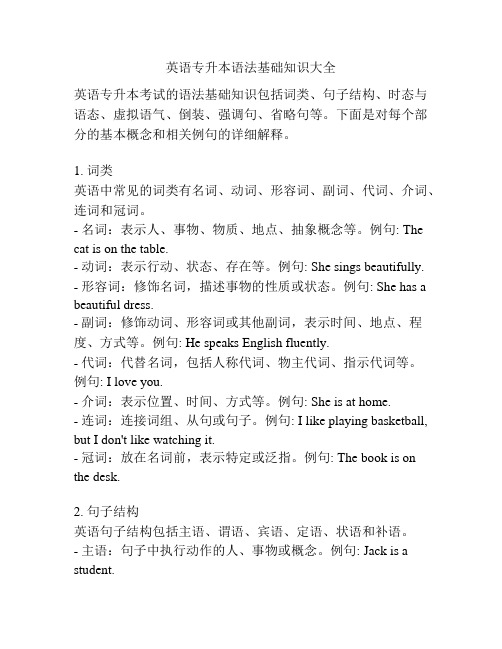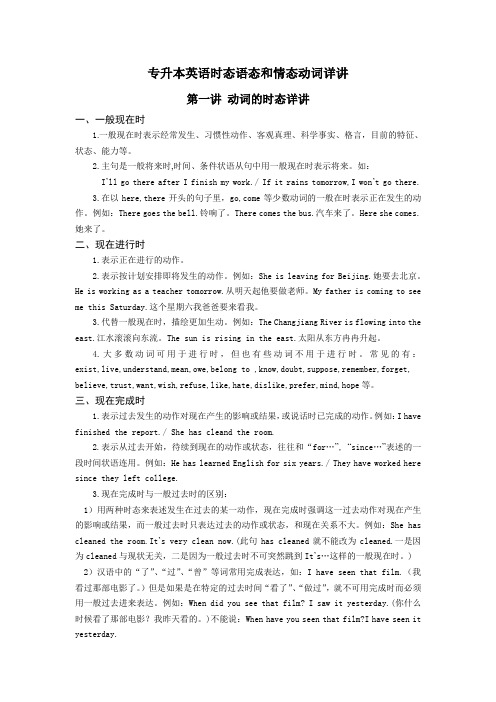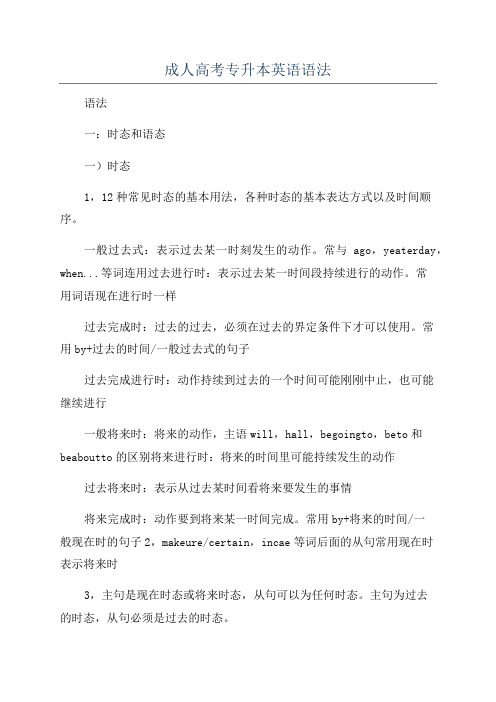专升本英语时态语态
英语专升本语法基础知识大全

英语专升本语法基础知识大全英语专升本考试的语法基础知识包括词类、句子结构、时态与语态、虚拟语气、倒装、强调句、省略句等。
下面是对每个部分的基本概念和相关例句的详细解释。
1. 词类英语中常见的词类有名词、动词、形容词、副词、代词、介词、连词和冠词。
- 名词:表示人、事物、物质、地点、抽象概念等。
例句: The cat is on the table.- 动词:表示行动、状态、存在等。
例句: She sings beautifully. - 形容词:修饰名词,描述事物的性质或状态。
例句: She has a beautiful dress.- 副词:修饰动词、形容词或其他副词,表示时间、地点、程度、方式等。
例句: He speaks English fluently.- 代词:代替名词,包括人称代词、物主代词、指示代词等。
例句: I love you.- 介词:表示位置、时间、方式等。
例句: She is at home.- 连词:连接词组、从句或句子。
例句: I like playing basketball, but I don't like watching it.- 冠词:放在名词前,表示特定或泛指。
例句: The book is on the desk.2. 句子结构英语句子结构包括主语、谓语、宾语、定语、状语和补语。
- 主语:句子中执行动作的人、事物或概念。
例句: Jack is a student.- 谓语:句子中说明主语动作或状态的部分。
例句: The cat is sleeping.- 宾语:接受动作的对象。
例句: She bought a book.- 定语:修饰名词或代词的词组或从句。
例句: I like the blue car.- 状语:修饰动词、形容词或副词的词组或从句。
例句: He waited patiently.- 补语:用来补充说明主语或宾语的信息。
例句: She is a teacher.3. 时态与语态- 时态:表示动作或状态发生的时间。
专升本英语语法与词汇知识点总结

专升本英语语法与词汇知识点总结在专升本的英语考试中,语法和词汇是两个至关重要的部分。
掌握好这两方面的知识,对于提升英语成绩和语言运用能力有着举足轻重的作用。
下面,我将为大家详细总结专升本英语中常见的语法和词汇知识点。
一、语法知识点(一)动词时态1、一般现在时表示经常发生的动作、存在的状态或客观真理。
其构成是主语+动词原形(当主语是第三人称单数时,动词要加“s”或“es”)。
例如:“He often goes to school by bike”2、一般过去时表示过去发生的动作或存在的状态。
构成是主语+动词的过去式。
如:“I played basketball yesterday”3、现在进行时表示正在进行的动作。
其结构是“主语+ be 动词+动词的现在分词”。
比如:“They are watching TV now”4、过去进行时强调过去某个时间正在进行的动作,形式为“主语+ was/were +动词的现在分词”。
像:“I was reading a book at that time”5、现在完成时表示过去发生的动作对现在造成的影响或结果,或者从过去开始一直持续到现在的动作。
其构成是“主语+ have/has +过去分词”。
例如:“She has learned English for five years”6、过去完成时表示过去某个时间之前已经完成的动作,结构是“主语+ had +过去分词”。
比如:“By the end of last year, we had learned 2000 words”(二)语态1、主动语态主语是动作的执行者。
例如:“He opened the door”2、被动语态主语是动作的承受者,构成是“be +过去分词”。
如:“The door was opened by him”(三)非谓语动词1、动词不定式具有名词、形容词和副词的特征,可作主语、宾语、定语、状语等。
专升本英语时态语态和情态动词详讲

专升本英语时态语态和情态动词详讲第一讲动词的时态详讲一、一般现在时1.一般现在时表示经常发生、习惯性动作、客观真理、科学事实、格言,目前的特征、状态、能力等。
2.主句是一般将来时,时间、条件状语从句中用一般现在时表示将来。
如:I’ll go there after I finish my work./ If it rains tomorrow,I won’t go there.3.在以here,there开头的句子里,go,come等少数动词的一般在时表示正在发生的动作。
例如:There goes the bell.铃响了。
There comes the bus.汽车来了。
Here she comes.她来了。
二、现在进行时1.表示正在进行的动作。
2.表示按计划安排即将发生的动作。
例如:She is leaving for Beijing.她要去北京。
He is working as a teacher tomorrow.从明天起他要做老师。
My father is coming to see me this Saturday.这个星期六我爸爸要来看我。
3.代替一般现在时,描绘更加生动。
例如:The Changjiang River is flowing into the east.江水滚滚向东流。
The sun is rising in the east.太阳从东方冉冉升起。
4.大多数动词可用于进行时,但也有些动词不用于进行时。
常见的有:exist,live,understand,mean,owe,belong to ,know,doubt,suppose,remember,forget, believe,trust,want,wish,refuse,like,hate,dislike,prefer,mind,hope等。
三、现在完成时1.表示过去发生的动作对现在产生的影响或结果,或说话时已完成的动作。
英语知识点归纳专升本

英语知识点归纳专升本一、语法知识点1. 时态- 现在时态(Simple Present Tense)表示现阶段普遍的真实情况或习惯动作。
- 过去时态(Simple Past Tense)表示过去已经发生的事实或状态。
- 将来时态(Simple Future Tense)表示将要发生的动作或存在的状态。
2. 语态变化- 主动语态(Active Voice)表示主语是动作的执行者。
- 被动语态(Passive Voice)表示主语是动作的承受者。
3. 名词名词是指人、事物、地点等名字的词语。
在句子中可以作为主语、宾语、表语、定语等成分。
4. 代词代词用来替代名词,可以分为人称代词、物主代词、指示代词、反身代词等。
5. 形容词形容词用来修饰名词或代词,描述特征、性质、状态等。
6. 副词副词用来修饰动词、形容词、其他副词,表示方式、时间、地点、程度等。
7. 动词动词是指做或表示动作或状态的词语,可以分为及物动词和不及物动词。
8. 介词介词用来连接名词或代词与其他词语,表示关系、位置、方向等。
9. 连词连词用来连接句子、短语或词语,可以分为并列连词、从属连词和并列从属连词。
10. 冠词冠词用来限定名词,在英语中包括不定冠词"a/an"和定冠词"the"。
11. 数量词数量词用来表示数目或数量的词语,可以分为基数词和序数词。
12. 比较级和最高级比较级和最高级用于形容词和副词,用来比较两个或多个人或事物之间的差异。
13. 疑问词疑问词用来引导疑问句,包括who, what, where, when, why, how等。
14. 从句从句是包含一个主语和一个谓语的句子,可以作为主句或从句使用。
二、词汇知识点1. 同义词同义词是指意思相同或相近的词语,比如happy和glad。
2. 反义词反义词是指意思相反的词语,比如good和bad。
3. 多义词多义词是指有多个意思的词语,比如bank可以表示银行或岸边。
专升本英语时态考点整理

v C. had been waiting
v D. will have been waiting
二. 一般现在时
v 表示现在存在的特征和状态,习惯动作,经常性 动作或表示普遍真理及谚语,通常与表示频率的 时间状语连用。如:every week, on Sundays, sometimes, usually, often, twice a week .
v 4. Hardly\Scarcely.... When... 或 No sooner... than.......,e.g. No sooner had he gone to sleep than the telephone rang once more. 他刚刚睡着, 铃声再次响 起。
v 5. Plan, think, intend, hope, want, mean 等用 过去完成时,表示“打算做而没有做的事情〞, e.g. We had planned to attend the meeting, but we changed our mind. 我们本打算参加会议的,但是 我们改变主意了。
v 常见考点如下:
v 1. It has been + 一段时间+ since ...
v 2. This/It is +最高级/序数词+that从句,从句中的 谓语局部用现在完成时,e,g, It isn't the first time that I have found myself in an embarrassing situation.我已经 不是第一次发现自己处境为难了。
v 常见考点如下:
v 1. 在对过去事实进行虚拟的if 条件句中,e.g. If I had hurried, I wouldn' t have missed the train 要是我当
成人高考专升本英语语法

成人高考专升本英语语法语法一:时态和语态一)时态1,12种常见时态的基本用法,各种时态的基本表达方式以及时间顺序。
一般过去式:表示过去某一时刻发生的动作。
常与ago,yeaterday,when...等词连用过去进行时:表示过去某一时间段持续进行的动作。
常用词语现在进行时一样过去完成时:过去的过去,必须在过去的界定条件下才可以使用。
常用by+过去的时间/一般过去式的句子过去完成进行时:动作持续到过去的一个时间可能刚刚中止,也可能继续进行一般将来时:将来的动作,主语will,hall,begoingto,beto和beaboutto的区别将来进行时:将来的时间里可能持续发生的动作过去将来时:表示从过去某时间看将来要发生的事情将来完成时:动作要到将来某一时间完成。
常用by+将来的时间/一般现在时的句子2,makeure/certain,incae等词后面的从句常用现在时表示将来时3,主句是现在时态或将来时态,从句可以为任何时态。
主句为过去的时态,从句必须是过去的时态。
二)被动语态1,不能用被动语态的情况:A:不及物动词B:表示状态而不是动作的词,如cot,fit,lack,want,wihuit等2,感官动词(hear,feel,litento,ee,watch,notice等),使役动词:have,make,help,let等。
被动时,需要将to补上。
3,被动语态一般都与其他考点综合考察,当看到选项有被动选项时,首先应该考虑是否具有被动关系。
二,非谓语动词一)动词不定式1,动词不定式短语作主语时,往往放在谓语动词的后面,用引导词it作形式主语。
如果不定式作宾语而又跟有补语,这时,通常要用"it"作形式宾语,而将不定式放到补语后面去。
2,动词不定式的逻辑主语:1)iti+adj+forb.常用于表示事物的特征特点,表示客观形式的形容词,如eay,hard,difficult,intereting,impoible等:2)iti+adj+ofb.的句型一般表示人物的性格,品德,表示主观感情或态度的形容词,如good,kind,nice,clever,foolih,right等。
英语专升本语法知识点汇总
英语专升本语法知识点汇总一、时态。
1. 一般现在时。
- 用法:- 表示经常或习惯性的动作或存在的状态。
例如:I go to school by bike every day.(我每天骑自行车去上学。
)- 表示客观事实或普遍真理。
例如:The earth moves around the sun.(地球绕着太阳转。
)- 结构:- 主语为第三人称单数(he/she/it等)时,动词要加 -s或 -es,如He likes reading. 其他人称用动词原形,如I like reading.2. 一般过去时。
- 用法:- 表示过去某个时间发生的动作或存在的状态。
例如:I visited my grandparents last weekend.(我上周末去看望了我的祖父母。
)- 结构:- 动词一般用过去式形式。
规则动词的过去式一般在词尾加 -ed,如work - worked;不规则动词有其特殊的过去式形式,如go - went。
3. 一般将来时。
- 用法:- 表示将来某个时间要发生的动作或存在的状态。
例如:I will go to Beijing next month.(我下个月将去北京。
)- 结构:- 常见的结构有will+动词原形,be going to+动词原形(表示计划、打算做某事或有迹象表明即将发生某事)。
如He is going to have a party tonight.(他今晚打算举办一个聚会。
)4. 现在进行时。
- 用法:- 表示现在正在进行的动作或存在的状态。
例如:She is reading a book now.(她现在正在读一本书。
)- 结构:- be动词(am/is/are)+动词的 -ing形式。
5. 过去进行时。
- 用法:- 表示过去某个时刻或某段时间正在进行的动作。
例如:I was watching TV at 8 o'clock last night.(昨晚8点我正在看电视。
专升本英语语法与词汇
专升本英语语法与词汇.第一章时态英语中谓语动词的时态(Tense)是一种动词的形式,不同的时态用以表示在不同的时间完成的动作或保持的状态。
英语动词共有十六种时态,这里将重点讲解其中较常用的十种时态。
一、一般现在时( The Present Indefinite Tense)1. 用于表示客观事实, 现在反复发生或习惯性的动作以及存在的特征、状态等,常与often, always, sometimes, usually, once a week, every day, seldom等时间状语连用。
【例句】The earth revolves around the sun.The students get up at six thirty every morning.2.表示按计划或安排好的将来的动作,常使用arrive, be, go, start, stay等动词。
【例句】There is a dancing party tonight.The plane arrives in Beijing at three this afternoon.3.用在以as soon as, when, after, while, as, until, till, whenever, the monment,theminute, immediately, directly等引导的时间状语从句中或以if, unless, as/so long as, in case, provided that等引导的条件状语从句中,代替一般将来时。
【例句】I’ll ring you as soon as he comes back.If it is fine tomorrow we will go swimming.The machine starts running the moment the button is pressed.●注:if条件句中,有will出现时,will是情态动词,意义为“愿意”,“肯”。
6年专转本英语真题解析及2021预测02-语法篇-时态与语态
B. had been staying
C. have been staying
D. have staved
【答案】B
【句意】救援队最终到来之前我们在这个孤岛上呆了三十个小时。
【解析】“救援队到来”是过去,“在这个孤岛上呆”是过去的过去,且一直持续到来的时候,仍然
在荒岛上。
2018/语法/将来完成时
40. By the time you get up, I ______for work.
31.To my relief, my son ____ beer since his best friend was fined for driving after drinking.
B. writes
C. wrote
D. would write
【答案】C 【解析】last year 时间状语对应一般过去时。中考难度的语法。总结:历年真题语法部分时态多与现 在完成时相关,主要原因是现在完成时表达“过去就开始发生”,“到现在才完成”,强调“影响”, 虽然不是太复杂,但很多同学对现在完成时是现在时态不太清楚。现在完成时与一般过去时一般将来 时靠近,可以互相关联对比,特别是一般过去时与之联系紧密。 2020/时态、语态/现在完成时的被动语态
A. was being repaired
B. was repairing
C. was repaired
D. has been repaired
【答案】A
【句意】他不能用他自己的车,因为当时正在修理。
【解析】考查过去进行时的被动语态
2019/时态、语态/将来完成时
40. We plan to finish the project on the 10th of next month. By then, we______ on it for ten weeks.
专升本英语语法知识点精讲
专升本英语语法知识点精讲对于许多想要通过专升本来提升自己学历的同学来说,英语语法是必须要攻克的难关之一。
掌握好英语语法不仅能够帮助我们在考试中取得好成绩,更能为今后的英语学习打下坚实的基础。
接下来,就让我们一起深入了解一些专升本英语语法的重要知识点。
一、动词时态动词时态是英语语法中的核心内容。
在专升本考试中,常见的时态包括一般现在时、一般过去时、一般将来时、现在进行时、过去进行时、现在完成时、过去完成时和过去将来时。
1、一般现在时表示经常发生的动作、客观事实或真理。
例如:“The earth revolves s around the sun”(地球绕着太阳转。
)其构成是主语+动词原形(当主语是第三人称单数时,动词要加“s”或“es”)。
2、一般过去时用于描述过去发生的动作或状态。
比如:“I played basketball yesterday”(我昨天打篮球了。
)构成是主语+动词的过去式。
3、一般将来时表示将来要发生的动作,常见的表达有“will +动词原形”和“be going to +动词原形”。
例如:“I will go to Beijing next week” (我下周要去北京。
)4、现在进行时表示正在进行的动作,结构为“be +现在分词”。
如:“She is reading a book now”(她现在正在读书。
)5、过去进行时强调过去某个时刻正在进行的动作,“was/were +现在分词”是其构成形式。
像:“I was watching TV at 8 o'clock last night” (昨晚八点我正在看电视。
)6、现在完成时表示过去发生的动作对现在造成的影响或结果,或者从过去开始一直持续到现在的动作。
“have/has +过去分词”为其结构。
例如:“I have learned English for five years”(我学英语已经五年了。
)7、过去完成时在过去某个时间点之前已经完成的动作,由“had +过去分词”构成。
- 1、下载文档前请自行甄别文档内容的完整性,平台不提供额外的编辑、内容补充、找答案等附加服务。
- 2、"仅部分预览"的文档,不可在线预览部分如存在完整性等问题,可反馈申请退款(可完整预览的文档不适用该条件!)。
- 3、如文档侵犯您的权益,请联系客服反馈,我们会尽快为您处理(人工客服工作时间:9:00-18:30)。
时态语态
1.A lot of buildings _____ and the place _____ very noisy ever since we moved here.
A. have been built; has become
B. have been built; became
C. were built; has become C. were built; became
2.The student studies hard, but sometimes he _____ trouble with English.
A. is being
B. will have
C. has
D. has had
3.By the time he retires, my father _____ for almost forty years.
A. has been working
B. has worked
C. will be working
D. will have worked
4.By the time you arrive in London, we _____ in Europe for two weeks.
A. shall stay
B. have stayed
C. will have stayed
D. have been staying
5.It’s reported that by the end of last month the sale of the company _____ by 10%.
A. has risen
B. has been risen
C. had risen
D. has been rising
6.John and I _____ friends for eight years. We first got to know each other at a Christmas party. But we _____ each other a couple of times before that.
A. had been; have seen
B. have been; have seen
C. had been; had seen
D. have been; had seen
7.Bill _____ a job in a factory, but he refused to take it.
A. was offered
B. offered
C. was offering
D. had offered
8.While we boys were working hard in the garden, our sisters _____ themselves in the sitting room.
A. had enjoyed
B. enjoy
C. were enjoying
D. would enjoy
9.It’s said that she _____ in a computer company since she graduated.
A. has employed
B. has been employed
C. had employed
D. is employed
10.We _____ a walk when it started to rain.
A. take
B. took
C. are taking
D. were taking
11.The washing machine needs _____ before it can be used.
A. repairing
B. to repair
C. being repaired
D. to be repairing
12.His bike _____ badly. The worker _____ it now.
A. was damaged; is repairing
B. damaged; repaired
C. had damaged; has repaired
D. is damaged; will repair
13.When you phoned me yesterday evening, I _____ the housework and was starting to take a bath.
A. had just finished
B. was finishing
C. have already finished
D. was going to finish
14.By the time we got to the cinema, the film _____ for half an hour.
A. has begun
B. had begun
C. has been on
D. had been on
15.They fulfilled the plan earlier than they _____.
A. have expected
B. expected
B. were expected D. had expected
16.Once _____, this power station will supply all the neighboring towns and villages with electricity.
A. it completing
B. be completed
C. it was completed
D. it is completed
17.By the time you get to Shanghai tomorrow, I _____ for Chongqing.
A. am leaving
B. will leave
C. will have left
D. had left
18.As long as you _____ the money back promptly, I’ll lend it to you with pleasure.
A. return
B. will return
C. have returned
D. returned
19.It is an exciting experience to work as a volunteer. It’s worth _____ all my life.
A. remembering
B. to remember
C. to be remembered
D. being remembered
20.I’m sure I _____ her four years ago.
A. have seen
B. saw
C. had seen
D. will see。
